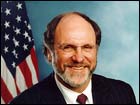|
Corzine answers critics
|
 |
February 7, 2002: 11:52 a.m. ET
Sen. Jon Corzine responds to critics of 401(k) reform and says where the Bush plan falls short.
By Staff Writer Martine Costello
|
NEW YORK (CNN/Money) - Back when Sen. Jon Corzine was chief executive of Goldman Sachs, he was a big believer in risk reduction and diversification.
Now, the New Jersey Democrat is among a cadre of Washington lawmakers who is taking on pension reform after thousands of employees at Enron lost more than $1 billion in their 401(k) when the stock plunged in value.
Corzine co-authored a bill with Sen. Barbara Boxer, D-Calif., that would put a 20 percent cap on company stock in 401(k)s. There is currently no limit in the law, though there is a cap of 10 percent in traditional pensions.
"It's something any responsible financial planner would suggest," Corzine said this week. "Don't put all of your eggs in one basket."
As part of the plan, investors would be able to sell their shares 90 days after they're vested in their 401(k), which usually takes about three years. The bill would also cut in half the tax deduction companies can make on stock contributions, in order to encourage them to contribute cash instead.
Corzine spoke with CNN/Money about his ideas on pension reform and responded to some of the criticisms to his plan. On Thursday, he testified before the Senate's Health, Education, Labor and Pensions Committee to talk about the bill and the importance of diversification.
CNN/Money: If you reduce the tax deduction for company stock contributions, do you think it will discourage companies from making any match at all?
Corzine: Now, companies are getting the benefit off reduced cash flow expenditures as well as the tax break, a more significant benefit than the cash match alone. It encourages a concentrated portfolio that almost any financial planner would suggest is not a good idea.
I'm not saying there won't be some companies that won't contribute, but it's for the employees' benefit. Those companies that believe in a strong commitment to employee benefit programs -- the 401(k) being one of them -- will continue to have a cash match.
CNN/Money: The 20 percent cap would also limit employees' ability to buy company shares for themselves, outside of the match. What about the idea that governments shouldn't be telling people how to invest their money?
Corzine: I find that an unbelievable argument, given that we have lending limits at sophisticated financial institutions. We have limits on (traditional pension) accounts, which are managed by professional money managers. And we have limits on financial institutions based on SEC regulations for securities firms. We have fiduciary rules for investment managers. I don't think it's paternalistic. It's the same thing we do for professional investors.
CNN/Money: Are companies living up to their fiduciary responsibilities with 401(k) plans?
Corzine: When you end up with 94 percent of company stock in a 401(k), as is the case with a great company like Procter & Gamble, 91 percent at Sherwin Williams, 90 percent at Abbott Labs, we've put something in place that is contrary to sound investment principles. It runs the risk of having those who may not have a lot of financial information and expertise exposed to risks that are generally acknowledged as inappropriate.
CNN/Money: What do you think about companies offering financial advice?
Corzine: It's a good idea, as long as there's a separation between the employer (and the person giving the advice). So the individual giving the advice is not accountable to the employer.
CNN/Money: President Bush last week outlined a plan to reform the pension laws. He proposed that employees be allowed to sell shares after three years, and called for regulations of 401(k) plan "lockdowns." What do you think of the president's plan?
Corzine: It provides some additional flexibility, allowing investors to sell shares after three years. But it fails to address the issue of concentration.
CNN/Money: Some critics argue that your bill and other recent proposals were made too quickly in response to the Enron tragedy, without proper research.
Corzine: Those people ought to look at the (stock) concentration in 401(k) accounts. I think they might be wise to do their own research and compare that concentration with what any responsible financial planner would suggest.
There were 257 bankruptcies among publicly-traded companies last year. The idea that people put all their eggs in one basket is not a good concept. It's certainly nothing I would have practiced as a responsible financial manager throughout my career. 
|
|
|
|
|
|

|

